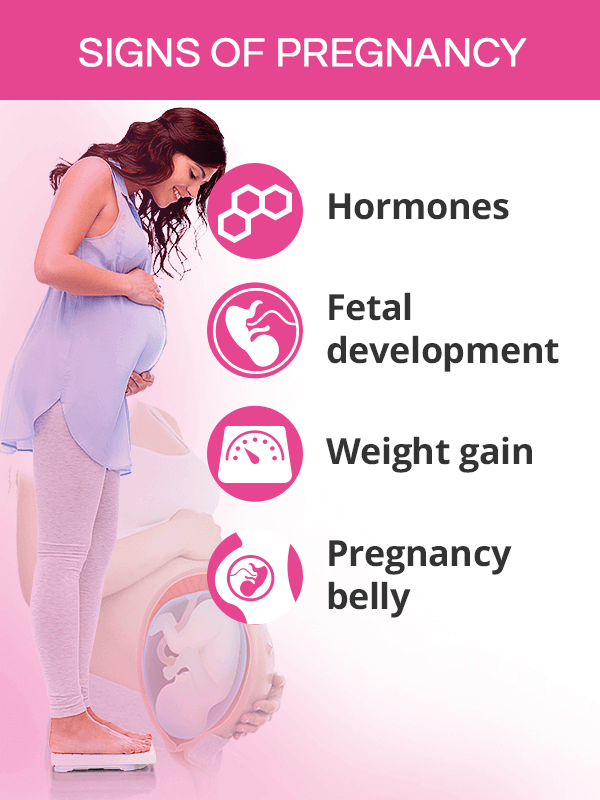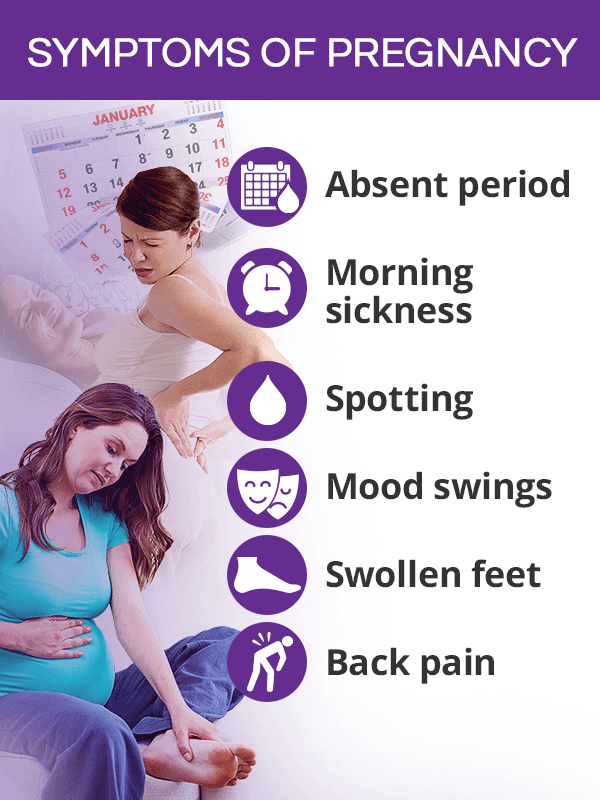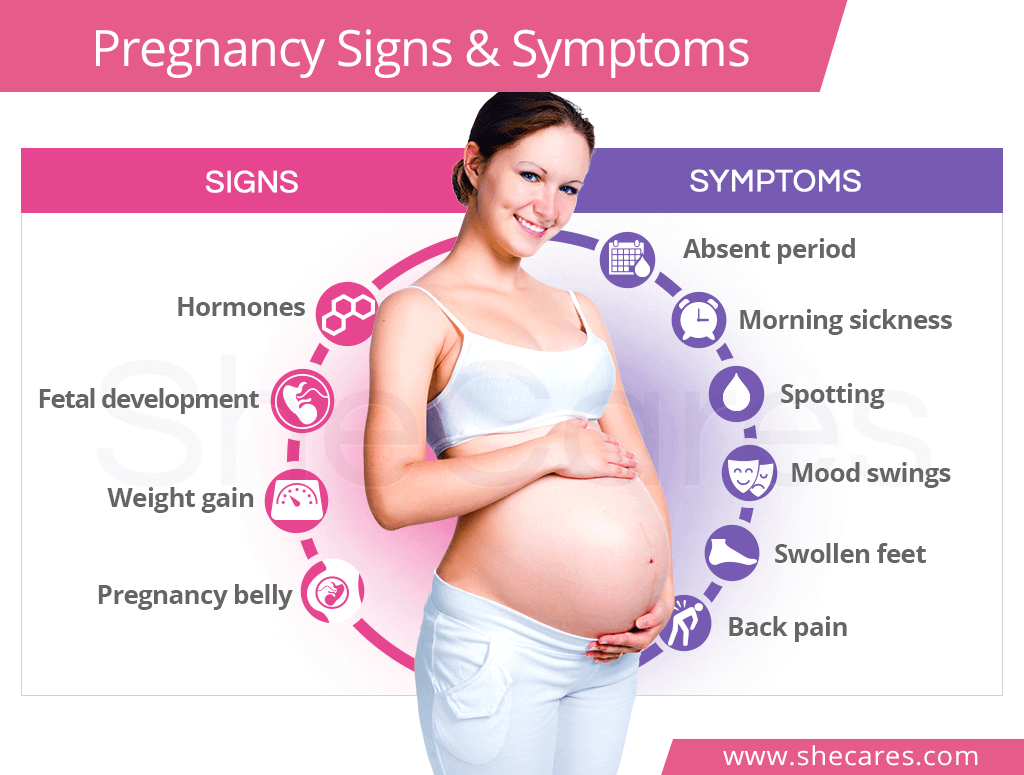Signs of Pregnancy

There are a number of signs of pregnancy, which can be obtained through a variety of pregnancy tests and monitored through prenatal testing. The most important pregnancy signs include the following:
Hormone Levels during Pregnancy
Starting from the day of conception until childbirth and through postpartum, hormones are the driving force behind pregnancy. The presence of human chorionic gonadotropin (hCG) in urine or blood is a solid sign of pregnancy, and monitoring hormone levels during pregnancy is a standard part of routine prenatal blood tests.
Fetal Development
Fetal development can be tracked through a transvaginal ultrasound as early as week 5 of gestation. The first visible sign of pregnancy is the gestational sac, in which the embryo develops. Through all pregnancy stages, the baby's heartbeat, size, and movement are closely monitored to ensure his or her proper development and well-being and to diagnose potential abnormalities early on.
Weight Gain during Pregnancy
Weight gain during pregnancy is not only expected, but also an important sign of pregnancy. The amount of weight a woman is recommended to gain while pregnant depends on her body mass index (BMI) and ranges from 25-35 lbs. (11.5 - 16 kg) for women with a normal BMI (18.5-24.9). Gaining less or more than what is recommended can lead to abnormal baby weight, developmental delays, and other pregnancy complications.
Pregnancy Belly
Probably the most visible sign of pregnancy is the growing belly. It is also a crucial reflection of the baby's growth. During the prenatal visits, the doctor will take note of a woman's fundal height, which is the distance from the pelvic bone to the top of the uterus. Measuring too small or too large for gestational age can mean a number of complications, such as intrauterine growth restriction, high or low amniotic fluid, and others.
Symptoms of Pregnancy

Although pregnancy signs are universal and somewhat expected in all aspiring mothers, pregnancy symptoms might vary from woman to woman as each pregnancy is a brand new and different experience.
Absent Periods
About 30% of women report a missed period as the first symptom of early pregnancy. It is most commonly a missed period that triggers them to reach for pregnancy tests. Once pregnancy is confirmed, a woman will not menstruate for its entire duration. Periods resume in postpartum, though might be delayed by breastfeeding.
Morning Sickness during Pregnancy
Nausea with or without vomiting that can occur at any time of the day is said to affect up to 50% of all pregnant women. It is the most prominent during the first trimester, starting around the sixth week of gestation and fading away near the 12th week. Although generally not dangerous for the mother and the baby, severe morning sickness can lead to hyperemesis gravidarum, a complication that can compromise a woman's nutrition and electrolyte balance.
Headaches in Pregnancy
Whether due to a massive hormonal influx in the first trimester or an overall burden of pregnancy weight in the last stretch, headaches during pregnancy are one of the most common complaints. Interestingly, some women report that their migraines during pregnancy are less frequent and less severe. If present with high blood pressure, headaches in the third trimester could indicate preeclampsia, a potentially dangerous pregnancy complication.
Pregnancy Spotting
Light, brown spotting during pregnancy is common across all trimesters and most commonly not a reason for concern. Vaginal bleeding, on the other hand, affects up to 30% of women in the first trimester, about half of which are due to a miscarriage. Heavy bleeding in the second and third trimester requires immediate medical attention for an evaluation of possible complications.
Mood Swings during Pregnancy
In most people's minds, pregnant women are almost synonymous with mood swings. Without a doubt, rapid hormonal changes, the intensity of pregnancy discomforts, fatigue, and natural doubts and anxious thoughts about becoming a parent can significantly destabilize a woman's emotions, leading to pregnancy mood swings and sometimes depression during pregnancy. This emotional roller-coaster is typically the most intense in the first and third trimesters.
Swollen Feet during Pregnancy
Most commonly appearing around the fifth month and intensifying in the last trimester, swollen feet in pregnancy are caused by fluid retention as the body produces more blood and fluid to support the needs of the developing baby. Swelling can also occur in the hands and the face, though if it happens suddenly and is excessive, it should be checked by a doctor to rule out preeclampsia.
Back Pain during Pregnancy
As perhaps the most anticipated symptom, lower back pain during pregnancy affects up to 70% of women. It is brought about by a variety of factors, including gaining pregnancy weight, hormones relaxing pelvic ligaments in preparation for childbirth, and center of gravity moving forward and affecting posture, among others. Severe back pain with cramping, however, requires a prompt check-up as it might indicate premature birth.
Other Pregnancy Pains & Discomforts
As it is nearly impossible to list all pregnancy symptoms, the aforementioned list includes the most common and notorious symptoms of being pregnant. Other frequently reported discomforts include, but are not limited to, the following:
- Leg, groin, or hip pain
- Acne
- Acid reflux
- Food cravings
- Food aversions
- Insomnia
Key Takeaways
While some women sail through pregnancy with ease, others are stricken with new discomforts until the very end. The most important signs of pregnancy expected in all pregnant women exceed past the increasing hormone levels to include important milestones in fetal development, weight gain during pregnancy, and the size of a woman's belly. Pregnancy symptoms, on the other hand, might vary woman to woman. While a missed period is usually the primary indication that a woman is expecting, it can soon be followed by morning sickness, headaches, spotting, mood swings, back pain, and other discomforts. Most of the aforementioned symptoms of being pregnant are common and normal; however, in some cases, their severe or sudden appearance might indicate pregnancy complications and require immediate medical attention.
Sources
- American Pregnancy Association. (2017). Headaches During Pregnancy. Retrieved June 18, 2019 from https://americanpregnancy.org/pregnancy-health/headaches-and-pregnancy/
- American Pregnancy Association. (2018). Morning Sickness During Pregnancy. Retrieved June 18, 2019 from https://americanpregnancy.org/pregnancy-health/morning-sickness-during-pregnancy/
- CDC. (2019). Weight gain during pregnancy. Retrieved June 18, 2019 from https://www.cdc.gov/reproductivehealth/maternalinfanthealth/pregnancy-weight-gain.htm
- Health Direct. (2018). Weight gain in pregnancy. Retrieved June 18, 2019 from https://www.pregnancybirthbaby.org.au/weight-gain-in-pregnancy
- March of Dimes. (2014). Bleeding and spotting from the vagina during pregnancy.Retrieved June 18, 2019 from https://www.marchofdimes.org/complications/bleeding-and-spotting-from-the-vagina-during-pregnancy.aspx
- Mayo Clinic. (2019). Back pain during pregnancy: 7 tips for relief. Retrieved June 18, 2019 from https://www.mayoclinic.org/healthy-lifestyle/pregnancy-week-by-week/in-depth/pregnancy/art-20046080
- Mayo Clinic. (2017). What's the significance of a fundal height measurement? Retrieved June 18, 2019 from https://www.mayoclinic.org/healthy-lifestyle/pregnancy-week-by-week/expert-answers/fundal-height/faq-20057962
- Medline Plus. (2019). Fetal Health and Development. Retrieved June 18, 2019 from https://medlineplus.gov/fetalhealthanddevelopment.html
- Planned Parenthood. (n.d.). Pregnancy Month by Month. Retrieved June 18, 2019 from https://www.plannedparenthood.org/learn/pregnancy/pregnancy-month-by-month
